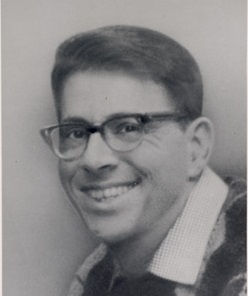by Craig Evans
In anticipation of one of my third-year module options, Bilingualism and Language Contact, I thought I’d investigate one of the more prominent theorists in the field. Here’s a short portrait of the individual behind the theory…
A time of war: of mass population displacement, of destruction and upheaval, of new beginnings in the midst of chaos. It was also the time of Uriel Weinreich’s formative teenage years. Weinreich was 13 when Germany invaded Poland in 1939. When it happened, the young Weinreich, who came from Wilno in the east of the country, was with his parents in Copenhagen. Weinreich’s father, Max, a renowned linguist specialising in the Yiddish language, was travelling with his family to the International Congress of Linguists in Brussels when they heard the news. Soon after, the Soviet Union advanced into east Poland, and the long-disputed territory of Weinreich’s birthplace, Wilno, was handed over to Lithuania, readopting its old name Vilnius. Europe was in the grip of war, the future seemed bleak and uncertain, and the best option left for the Weinreichs was to seek a new life in America.
Uriel Weinreich was perhaps always destined to become a scholar like his father. When they set sail for New York in 1940, they did so just father and son. Uriel’s mother, Regina, had returned to Poland to be with his younger brother, Gabriel, until they too were able to secure safe passage across the Atlantic. Under the close influence and tutelage of Max Weinreich, Uriel developed a passion for Yiddish culture and language, and this was to become the main focus of his future career in academia. In time he would establish himself as one of the leading figures in Yiddish studies: first through his world-famous College Yiddish (1949), a textbook on the language and culture still used by students to this day, and then as the founder of the project Language and Culture Atlas of Ashkenazic Jewry (LCAAJ).
After their arrival in New York, the Weinreichs settled into academic life, with Max having secured a post at City College of New York. Uriel thrived in his new home, proving himself a brilliant student who would eventually go on to study, and later teach, at Columbia University. Following in his father’s footsteps, his career as a Yiddish scholar may have seemed preordained, but Uriel Weinreich was by no means just a continuation of what had come before. The war had not only resulted in the deaths of millions, but also the scattering of communities, particularly Jewish communities, throughout the world. Weinreich himself had been displaced, and coupled with his multilingual upbringing, his experiences were to have a profound influence on his work. For his PhD thesis he researched bilingualism in Switzerland, and this was adapted, two years later, into the pioneering Languages in Contact (1953).
The violent and unpredictable nature of war is a powerful agent of change, both in terms of how the survivors live their lives and how they perceive the world. The effect of the 1939-1945 war on scholars was that it made them acutely aware of the dangers of relying too heavily on theories and methods thought up in classrooms. This was most tragically illustrated by the putting into practice of political theories such as National Socialism and Communism in ways that facilitated widespread acts of inhumanity. In the field of Language Contact, the over-reliance on theory-based methodologies entailed the generally accepted view that the results of contact between two or more languages could be predicted based on the internal structures of those languages. However, the publication of Uriel Weinreich’s landmark Languages in Contact in 1953 helped to establish a new approach to the subject, one that now combined linguistic analysis with descriptions of the specific communities where multiple languages are spoken.
While his pioneering achievements in the subdiscipline of Contact Linguistics may be enough to secure his place in history, Weinreich’s legacy extends beyond his role as the founder of a “systematized theory of language contact” (Clyne 1987, from Winford 2003). He wrote extensively on semantics, and was the mentor of Marvin Herzog and William Labov; his work with the latter on linguistic variation helping to lay the foundations for the field of Sociolinguistics. Perhaps though, for his contemporaries at least, the most extraordinary thing about Uriel Weinreich was how much he managed to achieve in a life cruelly cut short. Weinreich died of cancer in 1967, aged 40.
Remembering Weinreich many years later, Labov recalled “the perfect academic” who was “passionately interested in the ideas of others, brimming over with intellectual honesty, vigor and originality”. He was to feel forever indebted to his teacher: “I do not know how many of my ideas I brought to linguistics, and how many I got from Weinreich”. Writing an obituary in the journal Romance Philology, Yakov Malkiel described Weinreich’s “sensitive, almost boyish, face, his tempered youthfulness of manner”. To Malkiel, Weinreich’s “meteoric” rise to prominence was due to, among other things, his: “engaging personality, the precociousness and plasticity of his mind, [and] the smoothness and elegance of his oral delivery of papers”.
Uriel Weinreich:

References:
Hill, T. (2001). Weinreich, Uriel (1926-67). In Rajend Mesthrie and R. E. Asher (Eds.), Concise encyclopedia of sociolinguistics. Retrieved from http://search.credoreference.com/content/entry/estsocioling/weinreich_uriel_1926_67/0
Kim, R (2010) Uriel Weinreich and the Birth of Modern Contact Linguistics, from Languages In Contact ed. by Piotr P. Chruszczewski and Zdzisław Wąsik, 99-111. (Philologica Wratislaviensia: Acta et Studia, Vol. 4.)
Malkiel, Y (1968) Necrology – Uriel Weinreich, Jakob Jud’s Last Student, from Romance Philology, issue 1, vol. 22, p 128
Winford, D (2003) An Introduction to Contact Linguistics, Oxford: Blackwell Publishing Ltd
Photograph accessed from: sites.google.com/site/ahistoryoflanguage/a-history-of-linguistics